Communities should have the right to decide whether or not genetically modified organisms (GMOs) are released or field-trialled in their regions and, if so, whether any conditions should be placed on them, say the Soil & Health Association and GE Free Northland.
The two organisations again joined forces with Taitokerau mana whenua and others in court this week, responding to another case on the GMO issue brought by Federated Farmers, this time to the High Court in Whangarei. The judge’s decision is expected within a month.
“New Zealand has already seen inadequately contained GE field trials, in breach of the conditions of approval,” said Zelka Grammer, GE Free Northland chairperson. “We stand in support of the member councils of the Northland/Auckland Inter Council Working Party on GMOs, who are acting responsibly on their duty of care to the environment and constituents.”
“Federated Farmers claims to represent farmers, but many primary producers – organic and non-organic – are selling to high-value national and international markets that have zero tolerance for GE contamination,” said Marion Thomson, co-chair of Soil & Health.
Federated Farmers appealed the Environment Court decision in May 2015 that regional councils have the power under the Resource Management Act (RMA) to control the use of GMOs via regional planning instruments.
The Environment Court decision came about after Federated Farmers opposed Northland Regional Council’s proposed Regional Policy Statement, which included provisions relating to the use of GMOs in the region, and specifically included a policy requiring that a precautionary approach be taken to the introduction of GMOs.
Federated Farmers’ lawyer Richard Gardner argued in the High Court that central government passed the Hazardous Substances and New Organisms Act (HSNO) Act specifically for the purpose of controlling GMOs, and that parliament could not have intended for councils to duplicate that role under the RMA.
Soil & Health, GE Free Northland, Taitokerau mana whenua, Far North District Council and several other groups and individuals joined the appeal as section 274 (interested) parties pursuant to the RMA, in support of appellant Whangarei District Council. They were represented by Dr Royden Somerville, QC (senior counsel), and Robert Makgill (legal counsel).
Dr Somerville argued that Environment Court Judge Newhook was correct in his decision that the RMA and HSNO Act hold complementary and not overlapping roles. The two Acts offer different purposes and functional responses to the regulation of GMOs in New Zealand. Thus, regional planning documents can control the use of GMOs as part of promoting sustainable management under the RMA, taking account of regional needs.
The HSNO Act has a more confined role of regulating the granting (by the Environmental Protection Authority – EPA) of approvals to import, develop, field test or release new organisms as a ‘one-off’ regulatory transaction. The regulatory functions of the EPA under the HSNO Act do not allow for the provision of a regional approach to GMOs. That can only be dealt with under the RMA by regional councils and unitary authorities through policy statements and plans.
MEDIA CONTACTS:
Marion Thomson, co-chair, Soil & Health, 027 555 4014
Zelka Linda Grammer, chairperson, GE Free Northland, 022 309 5039
Organic dairy farmers reaping just rewards
/in Farming, Media Releases, OrganicsThe huge rise in the milk payout to organic dairy farmers is a welcome encouragement for the dairy sector to move towards clean, green and high-value production, according to the Soil & Health Association.
Fonterra just announced a big jump in the milk payout to organic farmers, due to increasing global demand. For the 2016-17 season organic farmers will receive $9.20 per kg of milk solids, up from the current organic price of $5.65. Non-organic milk solids fetch just $3.90.
“Consumers worldwide are demanding safe, healthy food, and are prepared to pay for high quality, GE-free, organic dairy products,” said Marion Thomson, co-chair of Soil & Health.
“It’s great to see Fonterra responding to this demand,” Thomson said. “Their announcement is a much more positive backing of organic dairy farmers than we have seen from them in the past.”
New Zealand organic dairy consumption mirrors the global trend. Domestic organic milk sales reportedly rose by 50% in 2014, according to the recently released NZ Organic Market Report. Nearly all the growth in domestic milk sales in 2015 came from organic milk (https://drive.google.com/file/d/18f0vUhTC4w8HMZ1o_I4Kg5Uy7_applRv/view?usp=sharing
To meet the demand, Soil & Health says organic milk processing needs to be more widely accessible in all regions, including the South Island.
Soil & Health expects to see increased interest from farmers in converting to organics.
“Organic dairying not only brings in a decent income for farmers, it also results in cleaner rivers and healthier people,” said Thomson.
Organic dairy farms have a lower environmental footprint than conventional farms, with improved soils and reduced nitrate leaching, resulting in cleaner waterways. Organic farms have lower greenhouse gas emissions and greater carbon capture in the soil. They have lower stocking rates, but receive a premium for a high-value, healthy product.
“To help farmers make the transition to organics, Soil & Health would like to see the government reinstate the successful organic advisory programme,” said Thomson. “New Zealand urgently needs to shift away from environmentally unsustainable farming practices and big irrigation schemes, and instead focus on sustainable farming.”
About two thirds of producers who took up the organic advisory programme went on to convert to organics.
NOTE:
The Organic Advisory Programme was established as part of an agreement between the Green Party and Labour Government, and ran from 2006–2009. http://www.scoop.co.nz/stories/BU0906/S00692/organic-advisory-programme-ends.htm
MEDIA CONTACT
Marion Thomson, co-chair, Soil & Health
027 555 4014
advocacy@organicnz.org.nz
Organic farming will revitalise waterways
/in Media Releases, WaterThe two most crucial moves we can make to improve New Zealand’s sadly degraded waterways are to stop dairy expansion, and to transition towards truly sustainable farming, according to the Soil & Health Association. Organic farmers are well ahead of the game in sustainable production and provide a model for a positive, healthy future for New Zealand. The latest issue of Soil & Health’s magazine, Organic NZ, includes an article ‘Dairy farming without nitrate leaching’ (May/June issue, just released this week).
“New Zealand’s waterways are in a dire state, with many showing a continuing deterioration in water quality, and no clear path for improvement.” said Marion Thomson, co-chair of Soil & Health. “The main driver of this is the increasing intensification of non-organic farms, and we urgently need to turn this around.”
“Organic and biological farming systems have a much lower ecological footprint, greater biodiversity and reduced nitrate leaching, making waterways healthier for all to enjoy,” she said.
Soil & Health welcomed the opportunity to submit on the consultation document “Next Steps for Fresh Water” which forms part of the Government’s freshwater reforms. The document outlines a range of bottom lines that healthy rivers must not fall below. One of these measures is human health, and the bottom line is that waterways must be safe for secondary contact, i.e. wading or boating.
“Weak bottom lines such as this will only allow water quality to decline,” said Thomson. “The bottom line must be swimmable rivers, and this needs to be a national target.”
However, given that a big factor in the pollution of waterways is nitrates from cow urine diffusing through soils, and from soluble nitrogen fertilisers, simply fencing off and planting around streams cannot solve this issue. Healthier fresh wateris achievable by ensuring stock numbers are sustainable, and by shifting to organic and biological fertilising practices that involve nitrogen-fixing pasture species, and healthy living soils with good moisture-holding capacity.
Soil & Health supports a number of other proposals in the consultation document that it believes have the potential to improve the management of freshwater in New Zealand. These include proposals for measuring water quality by catchment rather than region, and to exclude stock from waterways through regulation.
Media contact:
Marion Thomson
Co-chair, Soil & Health
027 555 4014
advocacy@organicnz.org.nz
Together we can keep Aotearoa GE-free!
/in GE, GM, Media Releases, Organic CommunityOne of the world’s oldest organic organisations is now using crowdfunding to help keep New Zealand’s valuable GE-free status.
The Soil & Health Association of New Zealand, founded in 1941, has just launched a Givealittle page to appeal for donations from a wide range of Kiwis who want a clean, green, GE-free Aotearoa.
Recently, Soil & Health has been defending the rights of councils to control the use of genetically modified organisms (GMOs) in their regions under the Resource Management Act.
Soil & Health’s new Givealittle page will help Kiwis contribute towards the costs involved in the High Court case held in Whangarei in February 2016. Soil & Health joined with others in the High Courtto protect Northland Regional Council’s ability to decide whether or not GMOs are released or field-trialled in Northland and, if so, whether any conditions should be placed on them. Soil & Health anticipates similar court cases in the future, so is also seeking funds now in preparation for these.
Any donations or financial support would be greatly appreciated and can be made viahttps://givealittle.co.nz/cause/soilandhealthstandagainstge.
Together we CAN keep Aotearoa GE-free!
For more information on the court case, visit: https://soilandhealth.org.nz/node/1102
For more information and GE and GMOs, visit: https://soilandhealth.org.nz/node/571
Celebrating 75 years of organics in NZ
/in Media Releases, Organic Community, OrganicsCutting an organic cake at Parliament today marked the 75th anniversary of the Soil & Health Association, one of the world’s oldest organic organisations. The cake ceremony was a highlight of the launch of the OANZ 2016 New Zealand Organic Market Report.
“We’re so proud to be part of a movement that is championing healthy soil, healthy food and healthy people,” said Marion Thomson, co-chair of Soil & Health.
According to the Organic Market Report, two out of every three Kiwis are buying organic products. The organic sector in New Zealand has grown by 11% per annum every year since 2012, being driven by consumer demand, which is outstripping supply. Organic grocery sales through supermarkets have increased by 127% since 2012.
“More and more people are looking for organic food, which gives assurance that it is safe, healthy, environmentally conscious and GE-free,” said Marion Thomson.
“The report is a powerful validation of the growing strength of organics when it comes to Soil & Health’s legal cases, as we defend the rights of communities via their councils to retain the right to be GE-free, or determine the use of any outdoor GMOs in their areas,” she said.
The Soil & Health Association has, since it was founded in 1941, promoted organic gardening and farming methods, healthy food and good nutrition. It is the largest organic membership organisation in New Zealand, and publishes Organic NZ magazine.
Natural Health & Supplementary Products Bill – Ministry of Health’s consultation paper ‘The Regulation of Natural Health Products’
/in SubmissionsSubmission on the Natural Health & Supplementary Products Bill
Ministry of Health’s consultation paper ‘The Regulation of Natural Health Products’
TO:
Natural Health Products
Ministry of Health
PO Box 5013
Wellington 6145
naturalhealthproducts@moh.govt.nz
FROM: Soil & Health Association of New Zealand
PO Box 340002
Birkenhead 0746
Auckland
4 March 2016
Re: the Ministry of Health’s consultation paper ‘The Regulation of Natural Health Products’
The Soil & Health Association of New Zealand Incorporated (‘Soil & Health’) is the largest membership organisation supporting organic food and farming in New Zealand, and is one of the oldest organic organisations in the world, formed in 1941. We are committed to advocating our maxim ‘Oranga nuku – Oranga kai – Oranga tangata’ meaning ‘Healthy soil – Healthy food – Healthy people’ and to creating an organic New Zealand.
The Soil & Health Association of NZ opposes the Natural Health Products Bill and requests that it be removed from the Order Paper.
Our opposition to this Bill includes the following reasons:
1. The Bill would drastically reduce access to, and options for, safe and effective healthcare for New Zealanders.
a) Natural medicines have been used safely and effectively for thousands of years. The Bill would, however, ban numerous natural health product ingredients without just cause. Some of these ingredients could in fact be everyday foods with a long history of safety.
b) The proposed regulations would severely limit health options for consumers by allowing only a very limited number of permitted ingredients on a ‘white list’.
c) The limited ‘white list’ approach would mean that many safe and effective natural health ingredients would become illegal.
d) Many of the ‘white list’ ingredients have severe dosage and application restrictions placed on them. There is no scientific or medical justification for this, and no history of risk to human health.
e) Soil & Health asks that the current, sensible ‘black list’ approach is retained, so that natural health products are ‘innocent until proven guilty’. If they are shown to cause harm, they are banned and added to the black list.
2. The Bill would severely affect natural health practitioners, who would be robbed of numerous safe and effective health products to recommend to their patients. This would limit or destroy their businesses, as well as impacting on their ethical duty of providing the best care for their patients.
3. The Bill would severely affect New Zealand natural health producers and suppliers, driving many small-to-medium enterprises out of the market.
a) The Bill introduces significant new compliance costs on New Zealand businesses to prove that a natural health ingredient to be safe so it can be added to the proposed ‘white list’.
b) The compliance costs for businesses go well beyond proving that an ingredient is safe. Costs include notifying the regulator about each ingredient, paying annual fees, providing information about health benefit claims, obtaining a licence to manufacture the product, and complying with the Code of Manufacture Practice. The sum total of compliance costs will be out of reach of many businesses as it could reach into the tens of thousands of dollars or even more.
c) Businesses will not be able to provide as great a range of natural health products, for sale in New Zealand, or for export.
d) The only manufacturers likely to be able to survive will be the larger ones.
e) If consumers are unable to find the products they want in New Zealand they will buy online and import them, therefore bypassing our local industry.
This is a Bill whose only benefits are for large and/or multinational companies who can afford to stay in business under this regime, and for the pharmaceutical industry. The primary goal of health legislation or regulation must be the health of New Zealanders. However this Bill does nothing to improve people’s health – in fact it will worsen the health of New Zealanders, as we would lose numerous safe and effective healthcare options.
REQUEST
Soil & Health asks that the Bill and associated proposed regulations be abandoned.
Submission in opposition to clause 105 of the Resource Legislation Amendment Bill 2015
/in Submissions14 March 2016
The Committee Secretariat
Local Government and Environment Select Committee
Parliament Buildings
Wellington
Submission in opposition to clause 105 of the Resource Legislation Amendment Bill 2015
Introduction
Detailed submissions
Genetically Modified Organisms
[48] … I find that there is nothing present in these pieces of legislation to prevent the establishment of objectives, policies and methods to achieve integrated management of natural and physical resources in the broad terms directed by the RMA.
[49] I consider that there is a readily identifiable policy reason for that in these pieces of legislation, read together. Once having been approved for import and release into New Zealand under HSNO, regional authorities can provide for use and protection of them together with other resources in a fully integrated fashion, taking account of regional needs for spatial management that might differ around the country for many reasons, not the least of which might include climatic conditions, temperatures, soils, and other factors that might drive differing rates of growth of new organisms and/or of other organisms, as just a few of perhaps many examples. I agree with the opposition parties that the RMA and HSNO offer significantly different functional approaches to the regulation of GMOs.
Conclusion
Yours sincerely
Name: Marion Thomson
Position: Co Chair
The Soil & Health Association
PO Box 340002
Birkenhead
Auckland 0746
Phone: 06 8775534
Mobile: 0275554014
Email: advocacy@organicnz.org.nz
Website: www.organicnz.org.nz
GE: it’s our right to decide
/in GE, GM, Media ReleasesCommunities should have the right to decide whether or not genetically modified organisms (GMOs) are released or field-trialled in their regions and, if so, whether any conditions should be placed on them, say the Soil & Health Association and GE Free Northland.
The two organisations again joined forces with Taitokerau mana whenua and others in court this week, responding to another case on the GMO issue brought by Federated Farmers, this time to the High Court in Whangarei. The judge’s decision is expected within a month.
“New Zealand has already seen inadequately contained GE field trials, in breach of the conditions of approval,” said Zelka Grammer, GE Free Northland chairperson. “We stand in support of the member councils of the Northland/Auckland Inter Council Working Party on GMOs, who are acting responsibly on their duty of care to the environment and constituents.”
“Federated Farmers claims to represent farmers, but many primary producers – organic and non-organic – are selling to high-value national and international markets that have zero tolerance for GE contamination,” said Marion Thomson, co-chair of Soil & Health.
Federated Farmers appealed the Environment Court decision in May 2015 that regional councils have the power under the Resource Management Act (RMA) to control the use of GMOs via regional planning instruments.
The Environment Court decision came about after Federated Farmers opposed Northland Regional Council’s proposed Regional Policy Statement, which included provisions relating to the use of GMOs in the region, and specifically included a policy requiring that a precautionary approach be taken to the introduction of GMOs.
Federated Farmers’ lawyer Richard Gardner argued in the High Court that central government passed the Hazardous Substances and New Organisms Act (HSNO) Act specifically for the purpose of controlling GMOs, and that parliament could not have intended for councils to duplicate that role under the RMA.
Soil & Health, GE Free Northland, Taitokerau mana whenua, Far North District Council and several other groups and individuals joined the appeal as section 274 (interested) parties pursuant to the RMA, in support of appellant Whangarei District Council. They were represented by Dr Royden Somerville, QC (senior counsel), and Robert Makgill (legal counsel).
Dr Somerville argued that Environment Court Judge Newhook was correct in his decision that the RMA and HSNO Act hold complementary and not overlapping roles. The two Acts offer different purposes and functional responses to the regulation of GMOs in New Zealand. Thus, regional planning documents can control the use of GMOs as part of promoting sustainable management under the RMA, taking account of regional needs.
The HSNO Act has a more confined role of regulating the granting (by the Environmental Protection Authority – EPA) of approvals to import, develop, field test or release new organisms as a ‘one-off’ regulatory transaction. The regulatory functions of the EPA under the HSNO Act do not allow for the provision of a regional approach to GMOs. That can only be dealt with under the RMA by regional councils and unitary authorities through policy statements and plans.
MEDIA CONTACTS:
Marion Thomson, co-chair, Soil & Health, 027 555 4014
Zelka Linda Grammer, chairperson, GE Free Northland, 022 309 5039
Project Gro 2015 – COMMUNITY GARDEN – OPUNAKE HIGH SCHOOL
/in Campaigns, Project GroThanks to the generous donations of Soil & Health members and supporters, the Project Gro fund has helped organic gardens in schools and communities around New Zealand.
Our project is based in Opunake, Taranaki. Project Gro funds have meant we have been able to reinvigorate the community garden on Opunake High School land that was established about five years ago, but had been in need of some attention with many of the workers (volunteer gardeners) having left the district to pursue employment opportunities.
I teach at the high school and have utilised the gardens as a project for school students in my Environmental Fitness whole-day course once every fortnight. With Project Gro funds we have purchased seeds, seedlings, rock dust, fertiliser and tools. We currently have beds brimming with garlic, brassicas, peas, beans and lettuce.
In the near future we will look at sustainability action projects within the school and community that students can work on for Education for Sustainability credits. Project Gro funds will assist here to get action underway.
Assistance has also been given to the Opunake High School garden, which is also looking the best it has for quite a while.
Peter Clement – Teacher
[columns] [span4]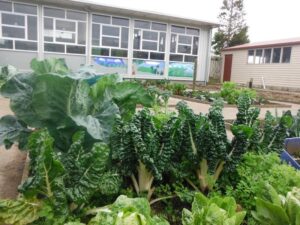
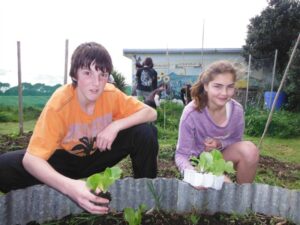
[/span4][span4]
[/span4][span4][/span4][/columns]
Project Gro 2015 – TERRACE END PLAYCENTRE – PALMERSTON NORTH
/in Campaigns, Project GroBelow are some photos of our Tamariki (children) and Larina planting our new fruit trees and some peas.
We already had a Lemon tree but through Project Gro we have since been able to purchase a dual Apple tree, Grape and Passion Fruit vines, Guava, Loquat and Manderin tree which we all look forward to harvesting. We also have a new raised bed!
[columns] [span4]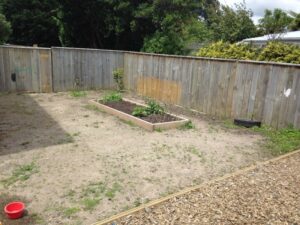

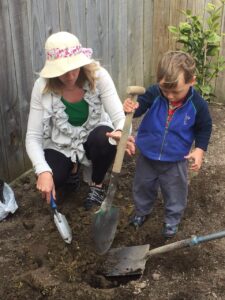 [/span4][/columns]
[/span4][/columns]
[/span4][span4]
[/span4][span4]
Project Gro 2015 – TEN ORGANIC FOOD GARDENS – TARANAKI
/in Campaigns, Project GroIn the past few years we have been working with whanau in Taranaki to establish Maara Kai at schools, Kohanga reo, marae and community gardens. Working closely with Hive Taranaki a local education provider for sustainability taught us that gardens are only as sustainable as the people working in them. The need for a mentoring service has been determined from previous experience in the region and observation that one of the main reason food gardens are not successful is because of the lack of ongoing support given to the gardeners or group once the garden has been established. It became apparent that gardens require mentoring and ongoing support to sustain themselves.
On behalf of the Te Whenua Tomuri trust we would submitted a proposal to provide a mentoring programme to assist ten organic food gardens in the Taranaki region.
The Maara Kai mentor worked with ten gardens to provide education on organic food production, provide knowledge and technical support to the gardeners and their climatic conditions, provide access to a national grower’s network, provide access to a regional seedbank and provide an online resources and information community to share success stories and increase the knowledge base.
The gardens are located in different parts of the region that provides a diverse range of soil and climatic differences and a diverse range of community. The mentoring project will provide information, education and support to encourage successful Maara Kai in the region of Taranaki. Healthy gardens Healthy people.
Who are we? Te Whenua Tomuri Charitable trust is based in Taranaki established for the purpose to educate and train people towards a more sustainable lifestyle. In particular to inspire people to take more active role in “Kaitiakitanga” or guardianship of our natural resources and practice sustainable techniques. Encouraging and mentoring people to practice organic gardening is a key objective for the trust.
[columns] [span3]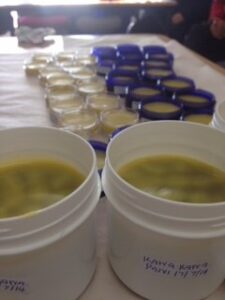
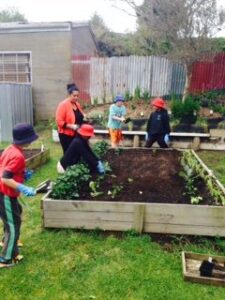
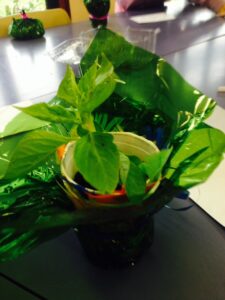
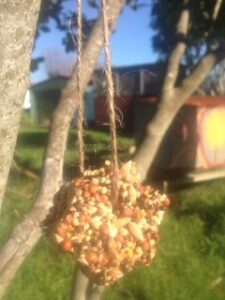
Students of Manukorihi Intermediate were taught about the healing qualities of Native plants by learning Rongoa Maori. Students got their hands dirty by entering the bush to pick the Rongoa and prepare the plant material ready for medicine making. With patience and collective energies tutor Pounamu Skelton (Ngati Te Whiti) taught the students how to make healing ointment that will treat skin rashes, bites and eczema.
[/span3][span3]
Creating a Maara Kai is a great place for energetics boys to do some exercise and talk amongst themselves. Together we made a thriving Maara that grew healthy organic vegetables and some tasty strawberries in the Eltham Community garden. The boys relished in the hands on learning activities. We celebrated by picking the fresh produce and making savoury muffins to share with their Whanau.
[/span3][span3]
Home-grown edible presents – nice idea.[/span3][span3]
During a Puanga celebration 100 students made bird feeders in the shapes of stars. During the winter months there is less food around for our birds so the kids got busy and made bird feeders. they were able to take them home and enjoy the excitement from the birds as they devoured the bird seed.[/span3][/columns]
Maari Kai mentor Pounamu Skelton from Te Whenua Tomuri Trust